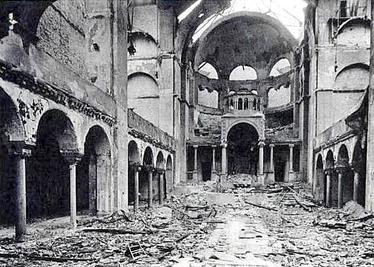“80 years ago the lives and history of Jews in Europe changed forever in the space of one night. The state-sponsored Antisemitism of the Nazi regime triggered the murder of Jews, the burning of synagogues, and the looting of Jewish-owned businesses and Jewish houses. Around thirty thousand Jewish people were deported during the ‘Kristallnacht’, an event which marked the beginning of the Holocaust and the extermination of six million Jews. Today we must pause and reflect on these events, and to remind ourselves of why we must do everything in our power to prevent this from ever happening again,” stated First Vice-President Frans Timmermans and Commissioner Věra Jourová on the occasion of the 80th anniversary of the ‘Kristallnacht’ (Night of Broken Glass).
“There is reason to be vigilant, for despite the horrors of our past, recent developments show that antisemitism is still present in our society; there are still individuals who deny that these events even took place. Jewish people are still being attacked and threatened on the streets of many EU countries; hate speech continues to be spread and there is still space to incite violence, not least online. Hatred started with words and ended in violence. And we are seeing that tendency again through the shocking murders in Toulouse, Brussels, Paris, and Copenhagen, and most recently in Pittsburgh in the United States,” they added.
The European Commission has a range of actions to combat antisemitism, such as monitoring how European legislation combating Antisemitism is implemented, and guiding Member States on how to tackle antisemitic hate crime and hate speech.
“We cannot allow our society to suffer from collective amnesia. We have a duty to continuously teach our young generations about this and how to tame Europe’s inner demons – so that nobody forgets. This is why we have dedicated funding for European remembrance, and why the Commission helps raise awareness and educate people about the Holocaust. To fight Antisemitism better, we need to understand it better as well. This is why the Commission continues to support Member States and civil society to improve reporting on Antisemitism in the EU. We have a Commission Coordinator on combating Antisemitism to liaise with Jewish communities and strengthen the collaboration with international organisations, Member States’ authorities and NGOs. The Horizon 2020 project ‘European Holocaust Research Infrastructure’ is the largest ever EU-funded research programme on the Holocaust, with a budget of €8 million and a goal of strengthening the network of European research on the Holocaust,” stated the two commissioners.
In 2015, First-Vice President Timmermans and Commissioner Jourová appointed a Commission Coordinator on combating Antisemitism to liaise with Jewish communities and strengthen the collaboration with international organisations, Member States’ authorities and NGOs.
“Jewish people should never again have to ask themselves whether they or their children have a future in the European Union. They should never have to question whether the authorities will stand on their side to guarantee their safety. Nobody should ever be afraid to go to a synagogue or wear a kippah in the European Union. Today, as every day, the European Commission stands firm against all forms of Antisemitism. We will continue to relentlessly fight prejudice and stereotypes in Europe, whomever it regards, and we will always defend people’s right to practise their religion – whichever it is – freely and without fear, they concluded.
More broadly to combat the spread of hate speech in Europe, the European Commission launched the EU Code of Conduct on countering illegal online hate speech in May 2016, with Facebook, Twitter, YouTube and Microsoft.

